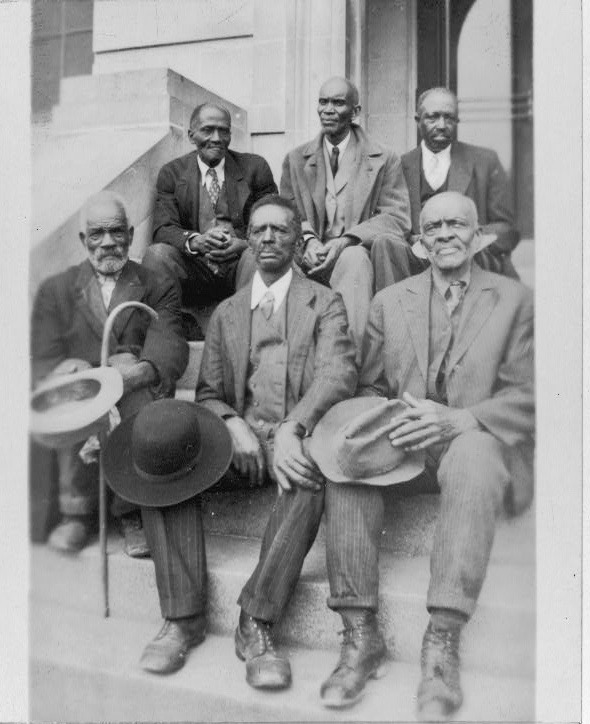
A 1937 gathering of ex-slaves in North Carolina. Photo: Library of Congress
Thursday, April 29
By accident, I am reading two history books at once. And although they concern places that are vast distances from each other and developments separated in time by a century, there is a similarity: Each volume looks at the disintegration of a system of near total political control.
I’ve long meant to read Eric Foner’s Reconstruction: America’s Unfinished Revolution, 1863-1877 but have been put off by its 700-page girth and by the fact that its subject seemed so irrelevant to our current-day experience. But the latter objection faded in the face of the recent presidential election, with its resonance to the Compromise of 1877, which placed a losing candidate in the White House.
So I picked up the book while we were in the city getting vaccinations during March.
Meanwhile, our viewing of Hulu’s Deutschland 83 made me want to know more about East Germany, its secret police, and its deformed socialism. I read an e-book version of Jenny Erpenbeck’s Visitation, which contains some reminiscences of the German Democratic Republic, and I endeavored to get an e-book history of East Germany from the library. But until recently, I was unable to acquire a copy of Anna Funder’s Stasiland.
So lacking any other book, I began reading Foner—and it turns out to be fascinating. I keep reading snippets of it out loud to Emily: Listen to this!
Then, 70-odd pages into Foner, the library informed me that Stasiland was available. I was afraid that if I turned it away, I’d not get another opportunity. So I got it—and it’s pretty fascinating, too.
I had first thought I would only read Foner’s account of the hard-to-imagine, corrupt deal that in 1877 placed the losing Republican, Rutherford B. Hayes, in the White House and sent winning Democrat Samuel J. Tilden home—in exchange for withdrawing federal troops from the once-traitorous, southern states.
“Huh?” any sane person might say. “How’s that? Come again?”
What does the movement of federal troops have to do with a national election? Well, back then the South’s white voters were a key component of the Democratic Party’s constituency. The presence of occupying federal troops kept whites from terrorizing blacks—which was particularly important once the 1870 15th Amendment to the Constitution guaranteed black males the right to vote. But if the two parties could agree—in a backroom deal—to let southern whites retake political control of their states…well, then, just who would occupy the White House seemed a minor matter. Right this way, Mr. Hayes.
(It’s probably unnecessary to point this out, but the two parties have switched ideals and constituencies. The GOP is now the party of white supremacy and voter suppression, and the Democrats are the party with the large African-American constituency. And we wonder why Europeans are mystified by our political history.)
By the turn of the 20th century, virtually all blacks were disenfranchised by the legislatures of every southern state. Back then, southerners used devices such as literacy tests and poll taxes to deny ballots to African Americans; today, they’re using gerrymandering, shorter voting hours, withdrawal of absentee balloting, and more to lock out black voters.
But I’m getting ahead of myself. Here are some of the “listen to this” revelations of the first 100-odd pages of Foner’s Reconstruction.
Although the war’s end was two years away, the institution of slavery had begun to disintegrate by 1863. Reports of “insubordinate” slave behavior multiplied across the south. Lincoln’s “emancipation proclamation” declared slaves to be free—but only those still inhabiting the Confederate territory. Nevertheless, thousands of blacks began enlisting in the Union Army, and that alone gave them new status: In army courts blacks could testify against whites and by 1864, they received equal pay with white soldiers. Many learned to read and write, and they debated the future society amongst themselves. When William T. Sherman’s army overwhelmed Atlanta and marched to the sea, thousands of former slaves marched behind it.
Former slaveholders admitted that they had never really known their slaves at all: Why were the slaves deserting, one planter wondered, if they had been “content, happy, and attached to their masters” as he had believed?
So what exactly would the former slaves do now? Various ideas contended: In Louisiana, sugar-plantation owners hastened to reaffirm their loyalty to the union—and federal authorities required their former slaves to continue laboring amid the sugar cane as wage workers. On Georgia’s Sea Islands and rice coast, on the other hand, Sherman issued a “field order” that transformed former slaves into small landholders. Each slave family was granted 40 acres of land and possibly the use of an army mule.
Louisiana’s always surprising demographics played a formative role in shaping reconstruction. New Orleans possessed a large, wealthy, and educated community of free blacks. Many spoke only French and educated their children at private schools in New Orleans or Paris. But in spite of their elevated rank, these people allied with the former slaves and agitated for the vote and other rights.
And as Richmond fell and the war came to a close, the former slaves paraded through southern city streets celebrating. Four thousand blacks paraded through Charleston behind a banner reading “We Know No Master but Ourselves.” In Richmond, blacks mobbed the streets, dancing, praying, and singing. Abraham Lincoln himself walked about the former Confederate capital accompanied only by a dozen sailors. Even today, it’s hard to imagine such spectacles.
In coming posts I will provide some equally startling details of life in East Germany.
Dinner: more artichoke chicken, American picnic potato salad, and a green salad
Entertainment: episodes of the German drama The Typist.




